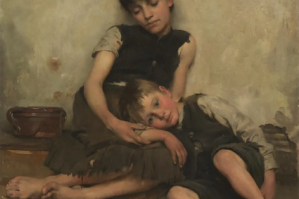I am David; Being Julia; Callas Forever; Phantom of the Opera
I am David
During the 1960s, Anne Holm's novel sold millions of copies and was read widely by children. The producers of this film remembered it and wanted to bring it to the screen forty years later. Directed by Paul Feig It has received a number of awards at festivals and has been screened for a number of NGOs, especially those concerned with refugees.
This is a refugee story for children, a blend of optimism as well as wariness about trusting people. The treatment is very straightforward, rather unsophisticated and easy to damn with faint praise by saying that it worthy. Accepting this worthiness, one must say that at times it is quite a moving little film.
The setting is 1952 in a Bulgarian gulag. David has been separated from his politically active parents and interned in the hard labour camp. The film opens with his escape from the prison. It then continues his journey to Greece, by boat to Italy, through Italy to Switzerland on his way to Denmark with a sealed envelope which will reveal the truth about him.
There are flashbacks to the harshness of the camp, working in the quarries, executions for stealing soap. David's friend in the camp, a bespectacled, self-sacrificing prisoner, Johannes, is played by Jim Caviezel. Joan Plowright plays a familiar role as an elderly artist who befriends and saves David. David himself is played with grim determination to survive by young British actor, Ben Tibber.
Because he meets with success, it could seem that the world is full of kind people eager to help this mysterious young refugee. However, it is not always easy. In fact, there are a lot of unfriendly people out there. But, this is a picture of the indomitable human spirit, aimed at a younger audience and their parents.
Being Julia
In the early 1980s, Hungarian director, Istvan Szabo, won an Oscar for Best Foreign Language film for Mephisto. It was a serious drama about an actor who sold his soul to the devil, like Faust. His devil was the Third Reich where he became a theatre celebrity. Twenty years later, Szabo has returned to the theatre and theatrics but this time it is the London West End in the late 1930s. This is a much more brittle, even superficial world than that of Nazi Germany. It is the world of prima donnas, backstabbing, ambitions and bitchiness. It is the world of Noel Coward. The source of this film is a novella, Theatre, by Somerset Maugham.
The film offers a tour-de-force opportunity for Annette Bening to strut both stage and screen, being the grande dame and delivering lines that remind movie buffs of Bette Davis in All About Eve. Bening takes full advantage of the role, playing with a convincing English accent, showing the vulnerability of a star in middle age, completely self-absorbed, desperate for something to keep her vitality. She has been the protégé of a long dead impresario who appears to her, counselling, warning, applauding, reminding her that the theatre is her real world and 'what civilians call the real world is only fantasy'.
Other people revolve around her: her theatre manager husband (Jeremy Irons), her doting business partner (Miriam Margolyes), her maid (Juliet Stevenson), an admirer (Bruce Greenwood), her son and other actors. However, she becomes involved in an affair with a young, snobbish American (Shaun Evans) and is transformed. We all know that this will be a bittersweet romance. Ultimately it is more bitter for the young man and the aspiring actress he falls in love with (Lucy Punch). Julia's idea of sweetness is revenge. If we thought that Julia was in any way down and out, the finale is a triumph of theatrical bitchiness.
This kind of entertainment is often amusing to watch and to listen to, very clever, very smart. But to meet these people off stage?
Callas Forever
Maria Callas died in 1977 at the age of 53. She had achieved worldwide fame as one of the great divas of the 20th century. This film creates a fictional story about the last months of her life.
Franco Zeffirelli is entitled to make a film about his great friend. For many years he resisted but finally found a way of paying tribute to her and to her singing. For those who admire Callas, it is an opportunity to reflect on her life and her career. (Zeffirelli generally avoids the time she spent as the companion of Aristotle Onassis, leaving it to photographs, some passing comments and an opinion about Jackie Kennedy.)
Whenever Fanny Ardant is on screen, the film comes alive. She gives what is often called a mesmerising performance. She had played Maria Callas on stage in Terence McNally's widely seen play, Master Class. Ardant looks life Callas, is able to portray the grande dame aspects of her life while revealing some vulnerability beneath the spoilt brat behaviour and the tantrums.
The screenplay suggests that Callas had become a recluse in Paris but was persuaded to come out of retirement to sing Carmen on video, lip-synching with recordings made years earlier. This gives the audience the possibility of seeing Ardant do Callas do Carmen. These sequences are vivid, powerful, reminding us that Zeffirelli has a strong reputation also as an opera director (including film versions of La Traviata and Otello).
Jeremy Irons is an entrepreneur who once managed Callas but is now promoting concerts by a guitar-smashing, audience insulting rock group. The superfluous sub-plot of his relationship with an artist is not particularly interesting or persuasive (or well acted by Jay Rodan as the artist). Joan Plowright is a journalist.
At the time of making the film, Zeffirelli was in his late 70s, a director who had achieved success in theatre, film and television. Perhaps his style is too ornate, flowery with the touches of camp to make his more recent films universally popular.
The Phantom of the Opera
The Phantom premiered in London's West End in its Lloyd Webber incarnation in October 1986. 80,000,000 tickets sold worldwide these past 18 years and still playing, the author-composer has decided it is the right time for the screen version.
While many reviewers are unshakeably convinced that 80,000,000 people are not only wrong but disgracefully wrong and incapable of recognising trash and derivative music. If, at this stage of this review, you find yourself agreeing with the reviewers, don't read on. This lavish and loud version is not for you.
If, on the other hand, your find your indignation rising against these alleged arbiters of taste, the film, directed by Joel Schumacher is definitely one to see.
At a minimum, it is an opportunity for those who have not been able to afford theatre tickets or who have not been near a theatre where The Phantom was playing to see and hear what the enthusiasm was all about. Again, it provides a very colourful and tuneful memento for those who loved their theatrical experience.
One reviewer who bristles at the mention of Andrew Lloyd Webber's name, concedes that the film's plot is still strong enough without the music and that the look of the film is outstanding. It certainly is a 'visual-feast' . The press notes use the word 'sumptuous' . We can add 'lush' and 'lavish'. The 1870s Paris settings mean that the visual style is a kind of baroque-gothic-gallic, pre-raphaelite- rococo. Something striking for everyone.
A new framework has been introduced: an auction of Opera House mementos in 1919, filmed in black and white with a return to 1919 at different stages of the film.
We spend a lot of time in the Opera House, its glittering auditorium (and the chandelier), the vast backstage area, the opulent foyer (for the beautifully-staged Masquerade) and the vast caverns, staircases, channels and rooms that constitute the world of the Phantom. The film opens out the play and includes a carriage ride, a chase by horse, visits to the cemetery, even a sword fight.
Several of the characters have been given back stories (including flashbacks to the Phantom's childhood). Raoul's presence has been increased. In fact, the plot of the film (which Lloyd Webber has co-written with director Schumacher) is more coherent than the play.
As regards the songs and music, we either like them or not. They are all here with full orchestra and reprises.
As regards the performances, Emmy Rossum is a charming Christine. However, Gerard Butler may disappoint many audiences as the Phantom. He is not a dominating screen presence (Patrick Wilson as Raoul comes across more forcibly) which lessens the drama. Again, one of the difficulties of seeing him close-up is that the final revelation of his disfigurement is not particularly startling or frightening.
On the other hand, the supporting cast, mainly British, give the film some substance: Miranda Richardson as the ballet mistress who knows the secret of the Phantom, Simon Callow and Ciaran Hinds as the bourgeois owners of the Opera House and Minnie Driver well over the top (director Schumacher advised her that no one pays to see 'under the top'!) as the haughty diva, Carlotta. Most fans should enjoy it.LONDON - 10 January 2005 - 1,557 words


















